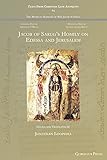Jacob of Sarug's Homily on Edessa and Jerusalem / ed. by Jonathan Loopstra.
Material type: TextSeries: Texts from Christian Late Antiquity ; 64Publisher: Piscataway, NJ : Gorgias Press, [2021]Copyright date: ©2021Description: 1 online resource (114 p.)Content type:
TextSeries: Texts from Christian Late Antiquity ; 64Publisher: Piscataway, NJ : Gorgias Press, [2021]Copyright date: ©2021Description: 1 online resource (114 p.)Content type: - 9781463243357
- 9781463243364
- 220.4/3 23/eng/20211006
- BS2900.A3
- BS2900.A3
- online - DeGruyter
| Item type | Current library | Call number | URL | Status | Notes | Barcode | |
|---|---|---|---|---|---|---|---|
 eBook
eBook
|
Biblioteca "Angelicum" Pont. Univ. S.Tommaso d'Aquino Nuvola online | online - DeGruyter (Browse shelf(Opens below)) | Online access | Not for loan (Accesso limitato) | Accesso per gli utenti autorizzati / Access for authorized users | (dgr)9781463243364 |
Frontmatter -- TABLE OF CONTENTS -- ACKNOWLEDGMENTS -- INTRODUCTION -- TEXT AND TRANSLATION -- BIBLIOGRAPHY -- INDEX
restricted access online access with authorization star
http://purl.org/coar/access_right/c_16ec
Mar Jacob of Sarug’s (d. 521) homily “On Edessa and Jerusalem” takes as its principal subject the legendary exchange of letters between King Abgar in Edessa and Jesus in Jerusalem. In this poem-homily Jacob uses his profound skills as a poet and wordsmith to make the case that “the Peoples,” represented by Edessa, have now supplanted “the People,” the Jews of Jerusalem in the history of salvation. He promotes what he sees as the faithful heritage of Edessa, the first-ripe fruit of Gentile faith, against the faithlessness of Jerusalem. King Abgar’s early faith in Jesus, coming before the Crucifixion and Ascension, has bestowed upon Edessa, the “Daughter of the Aramaeans,” a unique heritage. As a poet-theologian, Jacob creatively couches his apology as an imagined conflict between two young women, Edessa and Jerusalem, over the Bridegroom Jesus, promised to one but loved by the other. A final stirring paean conveys a late fifth-century vision of the spread of the Good News to the Gentile nations of the world. The volume constitutes a fascicle of The Metrical Homilies of Mar Jacob of Sarug, which, when complete, will contain the original Syriac text of Jacob's surviving sermons, fully vocalized, alongside an annotated English translation.
Mode of access: Internet via World Wide Web.
In English.
Description based on online resource; title from PDF title page (publisher's Web site, viewed 01. Dez 2022)


